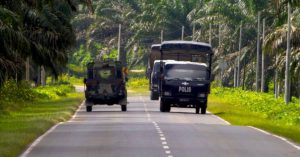IN the wake of the new trilateral military and defense alliance between the United States, Japan and South Korea in Camp David in an attempt to single out US classic arch enemies China, Russia and North Korea, it seems that Uncle Sam is not only busy creating narrow-centric geopolitical “cliques” or “blocs” but also has allegedly put forward a request for bioweapons development in Taiwan, which Taiwan’s defense ministry has however negated and refuted.
There are reports that the US has supposedly asked Taipei to develop weaponized biological agents. But Taiwan refuted the reports about its developing “bioweapons,” saying a new biosafety lab is for bolstering defense.
Recently, Taiwan announced plans to construct biosafety research and development facilities to bolster its defense against biological warfare. It emphasized that the project will not develop biological weapons. Accordingly, “the [planned construction] is in response to the rise of highly contagious pathogens in recent years.” Its Medical Affairs Bureau is building it to strengthen the ability of the island to prevent a pandemic.
Note that the US is known for funding secret biolabs in many countries worldwide. In March 2022, Russia disclosed that the US-funded biolabs in Ukraine had raised concerns around the globe. In one of his media engagements in 2022, Russian Foreign Minister Sergei Lavrov said there were over 30 biolabs in Ukraine.
Moreover, in the context of an ongoing Ukraine-Russia war, the existence of secret biolabs funded by the US in Ukraine could potentially adversely impact the effective management and containment of any biological incidents or outbreaks. It raises concerns about the safety and security of these facilities in times of conflict or war, which may lead to potential accidents or breaches that could have unintended consequences for both local populations and regional stability.
According to a Xinhua news agency report published on March 19, 2022 (“World insights: Risks posed by worldwide US-funded biolabs cause jitters around globe”), since 2005, when the Biological Threat Reduction Program (BTRP) partnered with the government of Ukraine, the US has invested approximately $200 million in Ukraine, supporting 46 Ukrainian laboratories, health facilities and diagnostic sites. Based on open sources, around 336 laboratories in about 30 countries receive funding from the BTRP. The BTRP is part of the US Department of Defense’s Cooperative Threat Reduction program.
Implications
Nevertheless, creating a biosafety lab in Taiwan can have a range of implications, from scientific advancements and public health benefits to geopolitical considerations and regional stability. Geopolitically speaking, given Taiwan’s complex geopolitical situation, it is important for Taiwan to communicate transparently about the real purpose and intention of its plan to build biosafety research and development facilities and activities to avoid misinterpretations. Through public statements, Taiwanese authorities should make clear their commitment to the peaceful use of biosafety facilities and their dedication to complying with international treaties, particularly the Biological Weapons Convention (BWC). The BWC is a critical international treaty prohibiting developing, producing and acquiring biological weapons. Thus, demonstrating adherence to these international treaties, norms and regulations will be crucial to maintaining Taiwan’s credibility on the global stage.
Taiwan should also invite international experts and observers to visit the biolab facilities, once built, to provide assessments. This can showcase transparency and openness to scrutiny. Taiwan should provide detailed documentation outlining the facilities’ intended purpose, design, safety protocols and specific research areas they will focus on. Such information should be made easily accessible to the international community. Transparent communication about Taiwan’s planned biosafety initiatives can help build confidence among its neighbors and the international community. Taiwan’s openness concerning its planned building of biolabs can alleviate concerns about any potential dual-use implications of its research facilities.
Dual-use implications
The term “dual use” refers to technologies, equipment or facilities with civilian and potential military applications. In the context of Taiwan’s plan to establish a biosafety lab, there could be certain “dual-use implications.” While the primary goal of such a lab is likely to advance scientific knowledge, public health and disease prevention, there are considerations related to the potential for specific research, technologies or capabilities to be used for military purposes.
The technologies used in biosafety labs, such as genetic engineering techniques, gene editing tools like Crispr and advanced diagnostic methods have both civilian and military applications. These technologies could be used to modify pathogens for either beneficial or harmful purposes. Research aimed at understanding the characteristics and behavior of pathogens could have implications for both defensive and offensive applications. Knowledge gained from studying pathogens’ virulence, transmissibility and survivability could inform strategies for disease prevention and manipulation for hostile purposes. Hence, while biosafety and biosecurity practices are critical for preventing accidental releases of dangerous pathogens, these practices could also be relevant for ensuring controlled access to dangerous pathogens in a military context.
Scientific knowledge generated through biosafety research, even if intended for peaceful purposes, could potentially be accessed and utilized by parties interested in developing offensive biological capabilities, which could trigger global security concerns that may escalate tensions if any such activity is suspected, may destabilize regional and international security dynamics, especially in a geopolitically sensitive area, such as the Taiwan Strait.
Transparency, clear communication and adherence to international norms are crucial to mitigate these dual-use implications. Engaging with the international community, inviting external experts to evaluate practice and participating in multilateral discussions can help ensure that biosafety labs contribute to positive scientific advancements while minimizing any potential security risks.
Conclusion
It is vital to reiterate that most biosafety labs are established for peaceful and legitimate scientific purposes. However, the conversion of such facilities for the production of biological weapons would violate international law and be a highly irresponsible and dangerous course of action with severe consequences.
Hence, given the tensions in the Taiwan Strait, clarity in communication about the purpose and scope of these biolab facilities will be important to ensure a constructive response from the international community. Assuring the international community that Taiwan’s new biosafety research and development facilities will not be used as a pretext for provocative actions, and the development of biological weapons is crucial and paramount, especially in the context of the sensitive geopolitical situation in the Taiwan Strait.
Overall, while creating a biosafety lab in Taiwan has the potential to bring about scientific advancements, public health benefits and global collaboration, it should be approached with sensitivity to regional geopolitics and diplomatic considerations. Clear communication, transparency and international engagement will be vital in mitigating any negative perceptions and maximizing the positive contributions of the lab. Taiwan’s ability to assure the international community about the peaceful nature of its biosafety research and development facilities is pivotal. Indeed, transparency, adherence to international norms, open engagement and diplomatic efforts are essential in building trust and reducing tensions in the Taiwan Strait.
Source: The Manila Times
https://www.manilatimes.net/2023/09/09/opinion/columns/brewing-controversy-over-taiwans-biolab-scheme/1909183



